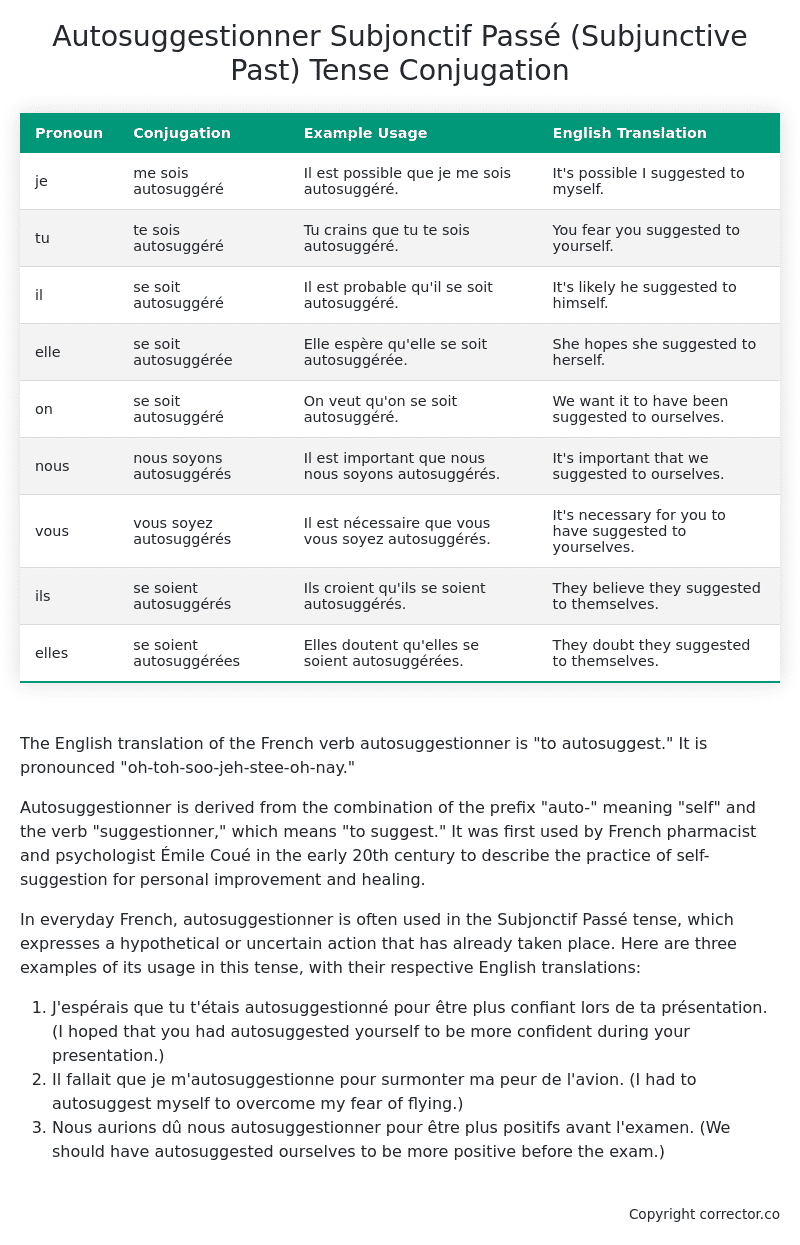Subjonctif Passé (Subjunctive Past) Tense Conjugation of the French Verb autosuggestionner
Introduction to the verb autosuggestionner
The English translation of the French verb autosuggestionner is “to autosuggest.” It is pronounced “oh-toh-soo-jeh-stee-oh-nay.”
Autosuggestionner is derived from the combination of the prefix “auto-” meaning “self” and the verb “suggestionner,” which means “to suggest.” It was first used by French pharmacist and psychologist Émile Coué in the early 20th century to describe the practice of self-suggestion for personal improvement and healing.
In everyday French, autosuggestionner is often used in the Subjonctif Passé tense, which expresses a hypothetical or uncertain action that has already taken place. Here are three examples of its usage in this tense, with their respective English translations:
- J’espérais que tu t’étais autosuggestionné pour être plus confiant lors de ta présentation. (I hoped that you had autosuggested yourself to be more confident during your presentation.)
- Il fallait que je m’autosuggestionne pour surmonter ma peur de l’avion. (I had to autosuggest myself to overcome my fear of flying.)
- Nous aurions dû nous autosuggestionner pour être plus positifs avant l’examen. (We should have autosuggested ourselves to be more positive before the exam.)
Table of the Subjonctif Passé (Subjunctive Past) Tense Conjugation of autosuggestionner
| Pronoun | Conjugation | Example Usage | English Translation |
|---|---|---|---|
| je | me sois autosuggéré | Il est possible que je me sois autosuggéré. | It’s possible I suggested to myself. |
| tu | te sois autosuggéré | Tu crains que tu te sois autosuggéré. | You fear you suggested to yourself. |
| il | se soit autosuggéré | Il est probable qu’il se soit autosuggéré. | It’s likely he suggested to himself. |
| elle | se soit autosuggérée | Elle espère qu’elle se soit autosuggérée. | She hopes she suggested to herself. |
| on | se soit autosuggéré | On veut qu’on se soit autosuggéré. | We want it to have been suggested to ourselves. |
| nous | nous soyons autosuggérés | Il est important que nous nous soyons autosuggérés. | It’s important that we suggested to ourselves. |
| vous | vous soyez autosuggérés | Il est nécessaire que vous vous soyez autosuggérés. | It’s necessary for you to have suggested to yourselves. |
| ils | se soient autosuggérés | Ils croient qu’ils se soient autosuggérés. | They believe they suggested to themselves. |
| elles | se soient autosuggérées | Elles doutent qu’elles se soient autosuggérées. | They doubt they suggested to themselves. |
Other Conjugations for Autosuggestionner.
Le Present (Present Tense) Conjugation of the French Verb autosuggestionner
Imparfait (Imperfect) Tense Conjugation of the French Verb autosuggestionner
Passé Simple (Simple Past) Tense Conjugation of the French Verb autosuggestionner
Passé Composé (Present Perfect) Tense Conjugation of the French Verb autosuggestionner
Futur Simple (Simple Future) Tense Conjugation of the French Verb autosuggestionner
Futur Proche (Near Future) Tense Conjugation of the French Verb autosuggestionner
Plus-que-parfait (Pluperfect) Tense Conjugation of the French Verb autosuggestionner
Passé Antérieur (Past Anterior) Tense Conjugation of the French Verb autosuggestionner
Futur Antérieur (Future Anterior) Tense Conjugation of the French Verb autosuggestionner
Subjonctif Présent (Subjunctive Present) Tense Conjugation of the French Verb autosuggestionner
Subjonctif Passé (Subjunctive Past) Tense Conjugation of the French Verb autosuggestionner (this article)
Subjonctif Imparfait (Subjunctive Imperfect) Tense Conjugation of the French Verb autosuggestionner
Conditionnel Présent (Conditional Present) Tense Conjugation of the French Verb autosuggestionner
Conditionnel Passé (Conditional Past) Tense Conjugation of the French Verb autosuggestionner
L’impératif Présent (Imperative Present) Tense Conjugation of the French Verb autosuggestionner
L’infinitif Présent (Infinitive Present) Tense Conjugation of the French Verb autosuggestionner
Struggling with French verbs or the language in general? Why not use our free French Grammar Checker – no registration required!
Get a FREE Download Study Sheet of this Conjugation 🔥
Simply right click the image below, click “save image” and get your free reference for the autosuggestionner Subjonctif Passé tense conjugation!

Autosuggestionner – About the French Subjonctif Passé (Subjunctive Past) Tense
Formation of the Subjonctif Passé
Everyday Usage Patterns
Interactions with Other Tenses
Present tense
Future tense
Conditional
Summary
I hope you enjoyed this article on the verb autosuggestionner. Still in a learning mood? Check out another TOTALLY random French verb conjugation!


